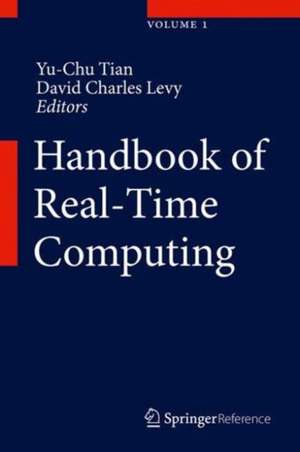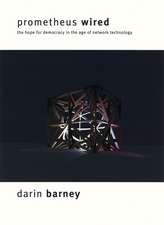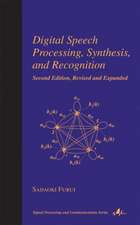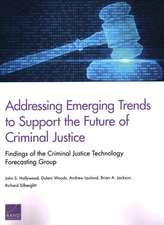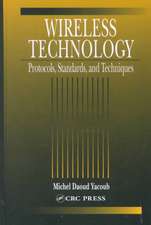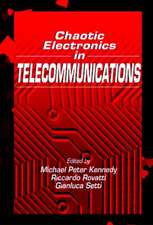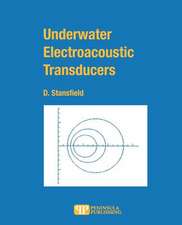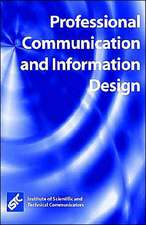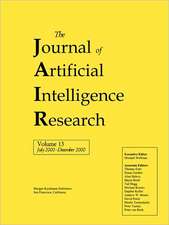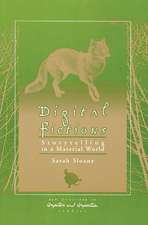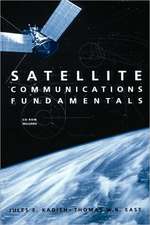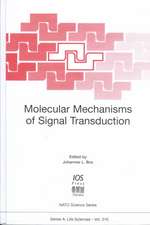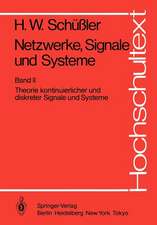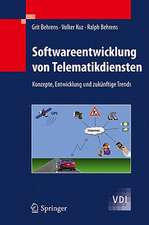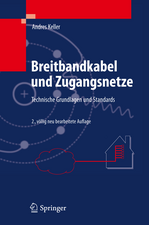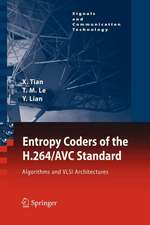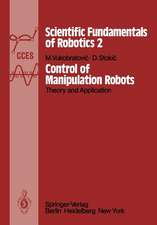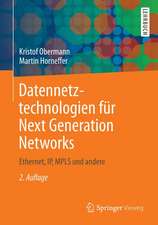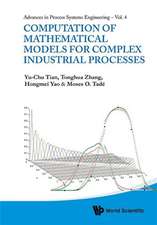Handbook of Real-Time Computing: Handbook of Real-Time Computing
Editat de Yu-Chu Tian, David Charles Levyen Limba Engleză Hardback – 9 aug 2022
- Real-time operating systems
- Real-time scheduling
- Timing analysis
- Programming languages and run-time systems
- Middleware systems
- Design and analysis tools
- Real-time aspects of wireless sensor networks
- Energy aware real-time methods
Preț: 4731.62 lei
Preț vechi: 5770.26 lei
-18% Nou
Puncte Express: 7097
Preț estimativ în valută:
905.52€ • 941.87$ • 747.55£
905.52€ • 941.87$ • 747.55£
Carte disponibilă
Livrare economică 24 martie-07 aprilie
Preluare comenzi: 021 569.72.76
Specificații
ISBN-13: 9789812872500
ISBN-10: 9812872507
Pagini: 1800
Ilustrații: XXIV, 1515 p. 352 illus., 227 illus. in color. In 2 volumes, not available separately.
Dimensiuni: 155 x 235 mm
Greutate: 2.84 kg
Ediția:1st ed. 2022
Editura: Springer Nature Singapore
Colecția Springer
Seria Handbook of Real-Time Computing
Locul publicării:Singapore, Singapore
ISBN-10: 9812872507
Pagini: 1800
Ilustrații: XXIV, 1515 p. 352 illus., 227 illus. in color. In 2 volumes, not available separately.
Dimensiuni: 155 x 235 mm
Greutate: 2.84 kg
Ediția:1st ed. 2022
Editura: Springer Nature Singapore
Colecția Springer
Seria Handbook of Real-Time Computing
Locul publicării:Singapore, Singapore
Public țintă
ResearchCuprins
Principles and Theories of Real-Time Computing.- Introduction to real-time computing.- Timing and timing control.- Hard, firm and soft real-time computing.- Multi-tasking and concurrency for real-time computing.- Finite state machines.- Time Petri nets.- Markov chain modeling.- Real-time in digital signal processing.- Hardware/software co-design.- Real-time databases.- Real-Time Scheduling.- Fundamentals of real-time scheduling.- Fixed-priority scheduling.- Dynamic priority scheduling.- Scheduling of soft real-time tasks.- Feedback scheduling.- Quality-of-control elastic scheduling for multiple control tasks.- Scheduling for periodic and sporadic tasks with/without jitters.- Management of shared resources.- Real-time access control.- Real-time scheduling for multi-core systems.- Real-time scheduling for distributed systems.- Further challenges in real-time scheduling.- Real-Time Programming and Middleware.- The evolution of real-time programming.- Real-time operating systems.- Real-time programming with C/C++.- Real-time Java.- Real-time programming with Ada.- Formal specifications for real-time software systems.- UML for real-time systems.- Reliability and fault tolerance in software.- Middleware for real-time computing.- Programming in microcontrollers.- Real-time programming in robot manipulation.- Real-time programming in unmanned aerial vehicles.- SCADA and DCSs.- Real-Time Networks and Communications.- Real-time communications over networks.- Principles of Time Synchronization.- Network time protocol NTP.- IEEE Precision Time Protocol PTP.- Precise Relative Clock synchronization for distributed control.- Real-time communications in a LAN.- Real-time transport protocols for real-time control.- Routing protocols for large-scale sensor networks.- Real-time MAC protocols for real-time systems.- IEEE networks for real-time applications with periodic traffic.- Messaging and communications in sensor networks.- Queuing protocols for real-time applications.- Cross-layer design for real-time networking.- Real-time networked control systems.- Hybrid system simulation of control applications over networks.
Notă biografică
Professor Yu-Chu Tian is a Professor of Computer Science and the Head of the NetCom Discipline within the School of Electrical Engineering and Computer Science (EECS) at Queensland University of Technology (QUT). He is an Australia Research Council CoE recognized Expert of International Standing, and an Assessor for research grant applications and research quality evaluation for ARC and several other funding agencies and organizations. He is a member of IEEE, IEAust, and IChemE. As an Associate Editor, he is serving the journal of Information Sciences published by Elsevier and Asia-Pacific Journal of Chemical Engineering published by Wiley. He is an ACM Reviewer for Computing Reviews. He is also acting as a Reviewer for a number of international journals. He is a technology provider to several Australian companies for complex systems engineering, real-time/embedded systems, and intelligent systems and robotics. Dr Tian is currently supervising 9 PhD/Masters students and several postdoc/visiting research fellows.
Professor Tian received the B.E. degree in Electrical Engineering (industrial automation) from Wuhan Institute of Technology, China, in 1982, the M.E. degree in Electrical Engineering (industrial automation/systems engineering) from East China University of Science and Technology, China, in 1987, the Ph.D. degree in Electrical Engineering (Industrial Automation/Intelligent Control and Decision) from Zhejiang University, China, in 1993, and the Ph.D. degree in Computer and Software Engineering from The University of Sydney, Australia, in 2009.
Professor Tian joined the Naval Academy of Engineering, China, in 1987, as a Lecturer in systems engineering. From 1994 to 1998, he worked at the Department of Electrical Engineering and the Institute of Industrial Process Control, Zhejiang University, China, where he was promoted to Associate Professor in Electrical Engineering in 1995. From 1996 to 1998, he was on leave from Zhejiang University to Hong Kong University of Science and Technology, as a Research Associate working on complex systems and process control. He moved to Australia in 1998, working as a Research Fellow at Curtin University of Technology. In 1999, he was elected as one of the four Western Australia Strategic Research Fellows. Since 2002, he has been working at Queensland University of Technology, Brisbane, Australia, initially as a Lecturer, later as a Senior Lecturer, the Networking Teaching Group Leader and Associate Professor in Computer Science, and currently as a Professor of Computer Science and the Head of the Discipline of Networks and Communications (NetCom). He also worked as a visiting professor in 2007 at the Department of Computer Science, The University of Maryland at College Park, USA.
Professor Tian received the prestigious Outstanding Young Researcher Award from Zhejiang Province in 1995 while working at Zhejiang University. He also won the Western Australia State Government Strategic Research Fellowship in 1999.
As the Chief Investigator, Professor Tian has won/completed over 20 research grants and projects, including 5 funded by Australian Research Council (ARC), 2 funded by Australian Cooperative Research Centre (CRC) and 1 funded by Australian Government Department of Education, Science and Training (DEST). He holds a patent on real-time control of large-scale and continuous galvanizing line. He has published a monograph on computation of mathematical models for complex industrial processes. He has also credited over 160 refereed papers in his publication record.
David C Levy is an Honorary Associate Professor in the School of Electrical and Information Engineering at the University of Sydney. He was Head of the disciplines of Computer and Software Engineering and Head of School prior to his leaving to pursue a private consulting career. He now acts as a technical advisor to two start-ups, does some occasional teaching in Australia and China and continues to supervise several graduate research projects. He has supervised over 50 graduate students to completion, received grants totaling in excess of 2.5 million and been on the organizing committee of 17 conferences, chairing 6, He is a member of the IEEE, ACM and served on the CDIO Council and on the Real Time Architectures committee of IFAC. He has acted as an assessor for grant applications in South Africa and Australia and has served as a reviewer for many conference papers.
Dr Levy received the B.E. degree in Electrical Engineering from the University of Natal, Durban, South Africa in 1970, followed by the MSc and PhD from the same institution. He taught Electronic Engineering at the University of Natal, with stints at the Technion, Israel and Clemson, USA. After an extended visit to the CSIRO in Australia, Dr Levy took up a position at the University of Sydney in 1994 where he led major curriculum revisions and served as Head of School.
Dr Levy holds two patents on embedded systems for chemical sensors. He has over 200 refereed papers on his publication record, along with a book and two book chapters.
Professor Tian received the B.E. degree in Electrical Engineering (industrial automation) from Wuhan Institute of Technology, China, in 1982, the M.E. degree in Electrical Engineering (industrial automation/systems engineering) from East China University of Science and Technology, China, in 1987, the Ph.D. degree in Electrical Engineering (Industrial Automation/Intelligent Control and Decision) from Zhejiang University, China, in 1993, and the Ph.D. degree in Computer and Software Engineering from The University of Sydney, Australia, in 2009.
Professor Tian joined the Naval Academy of Engineering, China, in 1987, as a Lecturer in systems engineering. From 1994 to 1998, he worked at the Department of Electrical Engineering and the Institute of Industrial Process Control, Zhejiang University, China, where he was promoted to Associate Professor in Electrical Engineering in 1995. From 1996 to 1998, he was on leave from Zhejiang University to Hong Kong University of Science and Technology, as a Research Associate working on complex systems and process control. He moved to Australia in 1998, working as a Research Fellow at Curtin University of Technology. In 1999, he was elected as one of the four Western Australia Strategic Research Fellows. Since 2002, he has been working at Queensland University of Technology, Brisbane, Australia, initially as a Lecturer, later as a Senior Lecturer, the Networking Teaching Group Leader and Associate Professor in Computer Science, and currently as a Professor of Computer Science and the Head of the Discipline of Networks and Communications (NetCom). He also worked as a visiting professor in 2007 at the Department of Computer Science, The University of Maryland at College Park, USA.
Professor Tian received the prestigious Outstanding Young Researcher Award from Zhejiang Province in 1995 while working at Zhejiang University. He also won the Western Australia State Government Strategic Research Fellowship in 1999.
As the Chief Investigator, Professor Tian has won/completed over 20 research grants and projects, including 5 funded by Australian Research Council (ARC), 2 funded by Australian Cooperative Research Centre (CRC) and 1 funded by Australian Government Department of Education, Science and Training (DEST). He holds a patent on real-time control of large-scale and continuous galvanizing line. He has published a monograph on computation of mathematical models for complex industrial processes. He has also credited over 160 refereed papers in his publication record.
David C Levy is an Honorary Associate Professor in the School of Electrical and Information Engineering at the University of Sydney. He was Head of the disciplines of Computer and Software Engineering and Head of School prior to his leaving to pursue a private consulting career. He now acts as a technical advisor to two start-ups, does some occasional teaching in Australia and China and continues to supervise several graduate research projects. He has supervised over 50 graduate students to completion, received grants totaling in excess of 2.5 million and been on the organizing committee of 17 conferences, chairing 6, He is a member of the IEEE, ACM and served on the CDIO Council and on the Real Time Architectures committee of IFAC. He has acted as an assessor for grant applications in South Africa and Australia and has served as a reviewer for many conference papers.
Dr Levy received the B.E. degree in Electrical Engineering from the University of Natal, Durban, South Africa in 1970, followed by the MSc and PhD from the same institution. He taught Electronic Engineering at the University of Natal, with stints at the Technion, Israel and Clemson, USA. After an extended visit to the CSIRO in Australia, Dr Levy took up a position at the University of Sydney in 1994 where he led major curriculum revisions and served as Head of School.
Dr Levy holds two patents on embedded systems for chemical sensors. He has over 200 refereed papers on his publication record, along with a book and two book chapters.
Caracteristici
Highlights the state of the art technology in real time computing
Organized to cater for students, academics and professionals from diverse scientific and engineering communities
Written by foremost experts from the field
Organized to cater for students, academics and professionals from diverse scientific and engineering communities
Written by foremost experts from the field
